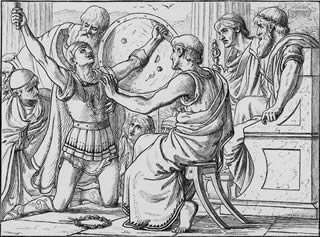Who made the run at Marathon? - 490 B.C.
Whether an Athenian solider really raced back by foot to warn Athens of the impending danger, will probably never be known. Too many lingering questions remain unanswered. Herodotus [1] does not say it was Pheidippides, only that 'they succeeded in reaching Athens before the barbarians did'. Plutarch is the earliest one who mentions him by name. But could this be true of a man who had just recently ran from Athens to Sparta and back and soon after just completing a battle also ask him to run Marathon?. By the time Plutarch was writing the story it was already blurred and the run had entered the pages of legend, the timeline anomaly had already been identified and so in his writings he gave a variety of names of the Athenian who brought the message back to Athens, including another version using Eckles.

|
However, we must also look at the agruments as to why Pheidippides would be likely to be chosen to run Marathon.
-In ancient times occupations were handed down father to son. So, if the father was a messenger the son was also groomed to be a messenger. The message could not be given to just any solider, it may be that he was best suited for the task. Herodotus tells us that during a similar time, all messengers in and out of Sparta was handled by the one Spartan family [3], it is not a stretch to think that this also happened in Athens. This may be why Pheidippides is refered to as 'a runner of long day-courses and one who practised this as his profession.' [2]
-The most compelling argument however, is that Pheidippides did successfully make the run back from Sparta to Athens, and not only accomplished that job but had said that he saw the god Pan on his journey back to Athens[2]. The sighting has been put down to hallucination, extreme heat the main suspect. But we know the Athenians believed him because a festival and ampitheatre was constructed for Pan next to the acropolis just after the Battle of Marathon, as this is the message that Pan delivered to Pheidippides. If the Athenians believed that Pan, a god, had revealed himself to Pheidippides while making that run, then certainly no Athenian is better suited to run Marathon than a man who had previously received a gods help.
But even other questions remain, such as it was reported that signals were being sent via a shield reflecting sunlight, when the Persians had rounded the cape and were headed towards Athens. Whether the signals were for the Persians or for the Greeks, is not clear. But with such military communications in place, why would they need to send a message back to Athens and not relay using their version of 'morse code'? But even if this was not viable, why wouldn't the messenger use an animal, such as a horse for aid? Though this can be explained away as the run would have meant the messenger needed to climb over a mountain range to make the direct route back to Athens, thereby complicating the reason for usinga horse. Another gap remains from the arrival of the message to Athens, the arrival of the ships to the last minute entrance of the Athenian hoplites.
A very interesting aspect of the situation is 'what is the benefit of sending one solider ahead to forwarn Athens?' There can only be one reasonable answer. The Persian fleet was on it's way to Athens and the message had to be given that the Athenians were victorious and not to surrender the city, especially as there was a faction in the city that was ready to turn the city over to the enemy. It is not as if the remaining citizens with that knowledge could hold off the invaders. There were no fighting men left in the city, all were at Marathon. Only women, children and the old were left behind[1]. Pheidippides arrival with their victory news would not have physically made a difference to Athens defence of the city, but mentally and morally they would not surrender the city. There is only one thing that Athens needed to stop the invading Persian fleet sacking Athens...their hoplite force.
It is reasonable that a message of some sort would have been sent forward from the army. The reality seems now lost forever being intertwined with Pheidippides journey to Sparta and back. Considering that the legend was firmly in place some 50+ years after the event, the chances of us today finding out what really took place some 2500 years later is verging on the impossible. What is more important and what must of happend is that 9 tribes raced back to Athens with all haste, leaving the 10th tribe of Antiochis behind, lead by Aristides 'the Just', who was the most trusted person in Athens, to look after the spoils of war. That is the amazing element about the race back from Marathon, it is not that one man might of it, but a whole army did.
References:

